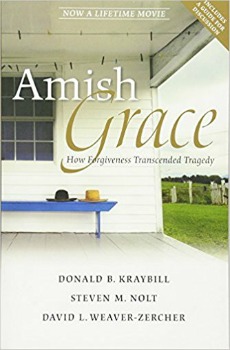 Amish Grace: How Forgiveness Transcended Tragedy by Donald B. Kraybill, Steven M. Nolt, David L. Weaver-Zercher springs from conversations with more than two dozen Amish people in the Nickel Mines area, site of a terrible murder and suicide. The forgiveness lavished by the Amish Community on the killer's widow, her parents, and the killer's parents gives us an unsullied lens through which to view our choices when others cause great harm.
Amish Grace: How Forgiveness Transcended Tragedy by Donald B. Kraybill, Steven M. Nolt, David L. Weaver-Zercher springs from conversations with more than two dozen Amish people in the Nickel Mines area, site of a terrible murder and suicide. The forgiveness lavished by the Amish Community on the killer's widow, her parents, and the killer's parents gives us an unsullied lens through which to view our choices when others cause great harm.
 Beatitudes For Today by James C. Howell reflects a theme found in a quotation on the wall of a children's home run by Mother Teresa's order: "People are unreasonable, illogical, and self-centered. Love them anyway." The book makes clear that the Beatitudes run counter to contemporary culture where the strong are saluted for winning, the meek are ridiculed, and those who seek peace often end up in jail.
Beatitudes For Today by James C. Howell reflects a theme found in a quotation on the wall of a children's home run by Mother Teresa's order: "People are unreasonable, illogical, and self-centered. Love them anyway." The book makes clear that the Beatitudes run counter to contemporary culture where the strong are saluted for winning, the meek are ridiculed, and those who seek peace often end up in jail.
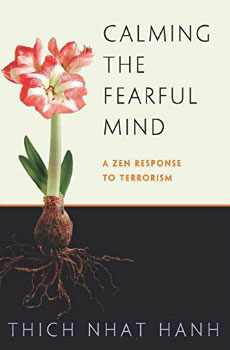 Calming the Fearful Mind: A Zen Response to Terrorism by Rachel Neuman and Thich Nhat Hanh is an inspiring collection of essays, dharma talks, and speeches that address the fear and misunderstanding that have been constants in the post-9/11 world. Thich Nhat Hanh points to community building as the most important action of this century. Working together and practicing together, we can create an alternative to terrorism.
Calming the Fearful Mind: A Zen Response to Terrorism by Rachel Neuman and Thich Nhat Hanh is an inspiring collection of essays, dharma talks, and speeches that address the fear and misunderstanding that have been constants in the post-9/11 world. Thich Nhat Hanh points to community building as the most important action of this century. Working together and practicing together, we can create an alternative to terrorism.
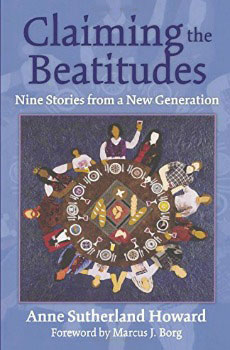 Claiming the Beatitudes: Nine Stories from a New Generation by Anne Sutherland Howard looks at each of the Beatitudes and one person's way of living it. Her stories come from seminary students, divinity school graduates, and people serving in churches and organizations around the country. Most are in their twenties and thirties, reminding us to be salt and light in a constantly changing world.
Claiming the Beatitudes: Nine Stories from a New Generation by Anne Sutherland Howard looks at each of the Beatitudes and one person's way of living it. Her stories come from seminary students, divinity school graduates, and people serving in churches and organizations around the country. Most are in their twenties and thirties, reminding us to be salt and light in a constantly changing world.
 The Dark Side of the Light Chasers: Reclaiming Your Power, Creativity, Brilliance, and Dreams by Debbie Ford helps readers own their dark qualities and use them in pursuit of wholeness. Ford examines the process of projection whereby we attribute our sense of inferiority to others, a process which can cause us to view others as our enemies.
The Dark Side of the Light Chasers: Reclaiming Your Power, Creativity, Brilliance, and Dreams by Debbie Ford helps readers own their dark qualities and use them in pursuit of wholeness. Ford examines the process of projection whereby we attribute our sense of inferiority to others, a process which can cause us to view others as our enemies.
 From Enemy to Friend: Jewish Wisdom and the Pursuit of Peace by Amy Eilberg reminds us that the greatest heroism -- according to the Jewish and Muslim faiths -- is to "transform an enemy into a friend, to move from hatred to caring, from suspicion and fear, beyond tolerance, to embrace of the other." This substantive book recounts Rabbi Eilberg's seven years of pursuing peace in her life and work.
From Enemy to Friend: Jewish Wisdom and the Pursuit of Peace by Amy Eilberg reminds us that the greatest heroism -- according to the Jewish and Muslim faiths -- is to "transform an enemy into a friend, to move from hatred to caring, from suspicion and fear, beyond tolerance, to embrace of the other." This substantive book recounts Rabbi Eilberg's seven years of pursuing peace in her life and work.
 God With Skin On: Finding God's Love in Human Relationships by Anne Robertson explores the extraordinary ramifications of the Incarnation and the relationships we have with ourselves,others, and our Creator. In her chapter on enemies as well as elsewhere throughout the book, Robertson makes it clear that we may be "the only Jesus some people ever meet."
God With Skin On: Finding God's Love in Human Relationships by Anne Robertson explores the extraordinary ramifications of the Incarnation and the relationships we have with ourselves,others, and our Creator. In her chapter on enemies as well as elsewhere throughout the book, Robertson makes it clear that we may be "the only Jesus some people ever meet."
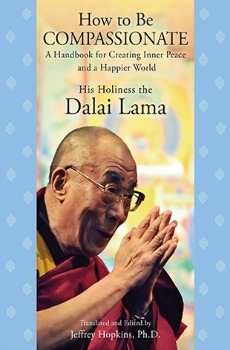 How to Be Compassionate: A Handbook for Creating Inner Peace and a Happier World by His Holiness the Dalai Lama shares Tibetan techniques to help us root our lives in altruistic concern to counterbalance the anger and selfishness which reigns in the marketplace. His Holiness sees this spiritual virtue as the road to relief, the path to equality, and the basis of human rights.
How to Be Compassionate: A Handbook for Creating Inner Peace and a Happier World by His Holiness the Dalai Lama shares Tibetan techniques to help us root our lives in altruistic concern to counterbalance the anger and selfishness which reigns in the marketplace. His Holiness sees this spiritual virtue as the road to relief, the path to equality, and the basis of human rights.
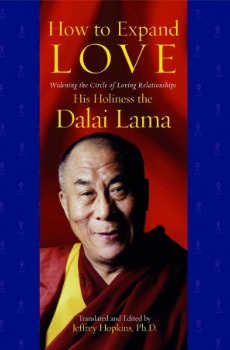 How to Expand Love: Widening the Circle of Loving Relationships by His Holiness the Dalai Lama considers seven steps for increasing love, such as recognizing friends, appreciating kindness, and seeking altruistic enlightenment. The Dalai Lama thinks of the Chinese, who have persecuted his people, as teachers who give him an opportunity to practice compassion.
How to Expand Love: Widening the Circle of Loving Relationships by His Holiness the Dalai Lama considers seven steps for increasing love, such as recognizing friends, appreciating kindness, and seeking altruistic enlightenment. The Dalai Lama thinks of the Chinese, who have persecuted his people, as teachers who give him an opportunity to practice compassion.
 A Lamp in the Darkness: Illuminating the Path Through Difficult Times by Jack Kornfield shows that we can use our hardships for good, but we have to choose to do so. Even when faced with adversity, we can navigate our way with practices of intention, peace, and equanimity.
A Lamp in the Darkness: Illuminating the Path Through Difficult Times by Jack Kornfield shows that we can use our hardships for good, but we have to choose to do so. Even when faced with adversity, we can navigate our way with practices of intention, peace, and equanimity.
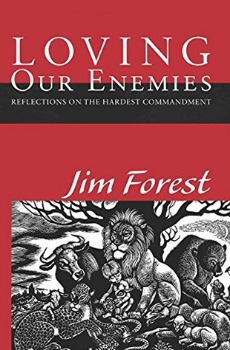 Loving Our Enemies: Reflections on the Hardest Commandment by Jim Forest reveals the difficulties we have with loving our enemies. But for followers of Jesus, there is no getting away from it: Jesus preached it and walked his talk every day of his brief life.
Loving Our Enemies: Reflections on the Hardest Commandment by Jim Forest reveals the difficulties we have with loving our enemies. But for followers of Jesus, there is no getting away from it: Jesus preached it and walked his talk every day of his brief life.
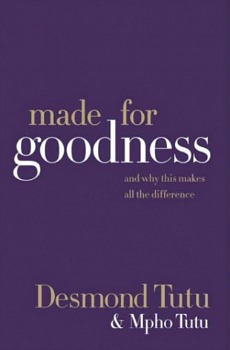 Made For Goodness and Why This Makes All the Difference by Desmond Tutu and Mpho Tutu states that murder and greed are not the norm for human behavior: the norm is goodness. The authors write that "Ubuntu is the Xhosa word used to describe the 'tend and befriend' survival behavior. ... A person is a person only through other persons, we say."
Made For Goodness and Why This Makes All the Difference by Desmond Tutu and Mpho Tutu states that murder and greed are not the norm for human behavior: the norm is goodness. The authors write that "Ubuntu is the Xhosa word used to describe the 'tend and befriend' survival behavior. ... A person is a person only through other persons, we say."
 No Enemy to Conquer: Forgiveness in an Unforgiving World by Michael Henderson gathers inspiring and edifying stories of individuals and organizations around the world who have sought to advance reconciliation among enemies and to bring about peace rather than sustain enmity. Henderson makes a strong case for the moral and ethical firepower of forgiveness in public life.
No Enemy to Conquer: Forgiveness in an Unforgiving World by Michael Henderson gathers inspiring and edifying stories of individuals and organizations around the world who have sought to advance reconciliation among enemies and to bring about peace rather than sustain enmity. Henderson makes a strong case for the moral and ethical firepower of forgiveness in public life.
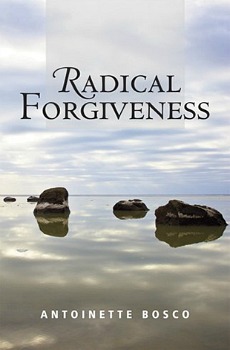 Radical Forgiveness by Antoinette Bosco provides an in-depth examination of the Christian practice of forgiveness. "If ever we are to have peace in this world," Bosco writes, "it must begin with the recognition that we need to change a long-established mindset that makes people of one country adversaries of another. We have to stop thinking of others as enemies and start seeing them as truly our kin."
Radical Forgiveness by Antoinette Bosco provides an in-depth examination of the Christian practice of forgiveness. "If ever we are to have peace in this world," Bosco writes, "it must begin with the recognition that we need to change a long-established mindset that makes people of one country adversaries of another. We have to stop thinking of others as enemies and start seeing them as truly our kin."
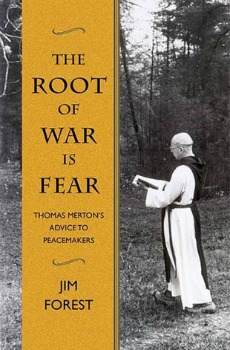 The Root of War Is Fear: Thomas Merton's Advice to Peacemakers by Jim Forest and Thomas Merton pays tribute to Merton though selections from his letters and other writings on war. It has an evergreen quality that will speak to the hearts of today's generations as they take up the struggle or peace and justice.
The Root of War Is Fear: Thomas Merton's Advice to Peacemakers by Jim Forest and Thomas Merton pays tribute to Merton though selections from his letters and other writings on war. It has an evergreen quality that will speak to the hearts of today's generations as they take up the struggle or peace and justice.
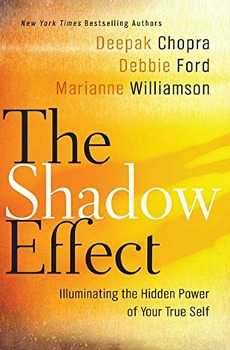 The Shadow Effect: Illuminating the Hidden Power of Your True Self by Debbie Ford, Deepak Chopra, Marianne Williamson recognizes that, in the words of Ford, "the shadow is not a problem to be solved or an enemy to be conquered but a fertile field to be cultivated." It's unusual to get three different perspectives and prescriptions to a common challenge in one book. One of them is sure to speak to your condition.
The Shadow Effect: Illuminating the Hidden Power of Your True Self by Debbie Ford, Deepak Chopra, Marianne Williamson recognizes that, in the words of Ford, "the shadow is not a problem to be solved or an enemy to be conquered but a fertile field to be cultivated." It's unusual to get three different perspectives and prescriptions to a common challenge in one book. One of them is sure to speak to your condition.
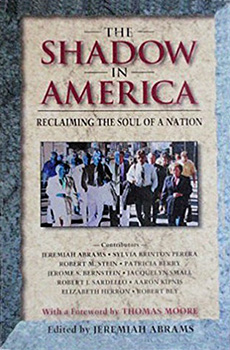 The Shadow in America: Reclaiming the Soul of a Nation by Jeremiah Abrams expands the definition of the shadow to include the dark twin, the disowned self, and the repressed self. Abrams has assembled nine essays which challenge us to discern shadow in our private lives and in American culture.
The Shadow in America: Reclaiming the Soul of a Nation by Jeremiah Abrams expands the definition of the shadow to include the dark twin, the disowned self, and the repressed self. Abrams has assembled nine essays which challenge us to discern shadow in our private lives and in American culture.
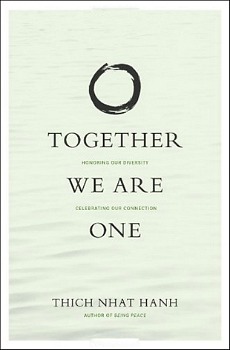 Together We Are One: Honoring Our Diversity, Celebrating Our Connection by Thich Nhat Hahn guides us to cultivate compassion, rid ourselves of separation impulses, and be open and hospitable to diversity. By developing compassion for ourselves, we can begin to travel the path of peace which leads eventually to having no enemies.
Together We Are One: Honoring Our Diversity, Celebrating Our Connection by Thich Nhat Hahn guides us to cultivate compassion, rid ourselves of separation impulses, and be open and hospitable to diversity. By developing compassion for ourselves, we can begin to travel the path of peace which leads eventually to having no enemies.
 We Have Met the Enemy: Self-Control in an Age of Excess by Daniel Akst is a hard-hitting work of cultural criticism that looks at the rampant self-indulgence and addiction afoot in America, a country where freedom and affluence provide the seedbed for such excesses. Akst quotes Pogo: "We have met the enemy and he is us."
We Have Met the Enemy: Self-Control in an Age of Excess by Daniel Akst is a hard-hitting work of cultural criticism that looks at the rampant self-indulgence and addiction afoot in America, a country where freedom and affluence provide the seedbed for such excesses. Akst quotes Pogo: "We have met the enemy and he is us."
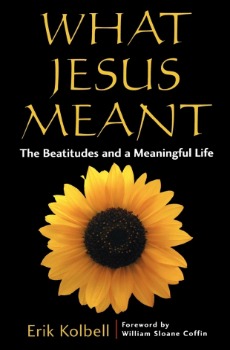 What Jesus Meant: The Beatitudes and a Meaningful Life by Erik Kolbell carries deep respect for the spiritual practice of justice. Jesus, the rabbi, shows us that the path of discipleship consists of meekness, empathy, righteousness, peace, persecution, purity, poverty, and simplicity. These qualities dramatically affect how we treat our perceived enemies.
What Jesus Meant: The Beatitudes and a Meaningful Life by Erik Kolbell carries deep respect for the spiritual practice of justice. Jesus, the rabbi, shows us that the path of discipleship consists of meekness, empathy, righteousness, peace, persecution, purity, poverty, and simplicity. These qualities dramatically affect how we treat our perceived enemies.
 Why Good People Do Bad Things: How to Stop Being Your Own Worst Enemy by Debbie Ford examines the wants, needs and habit energies that animate us to self-sabotage and self-destructiveness. Waking up from denial and becoming the person that we were meant to be means making peace with ourselves and our imperfections and conflicting desires.
Why Good People Do Bad Things: How to Stop Being Your Own Worst Enemy by Debbie Ford examines the wants, needs and habit energies that animate us to self-sabotage and self-destructiveness. Waking up from denial and becoming the person that we were meant to be means making peace with ourselves and our imperfections and conflicting desires.
